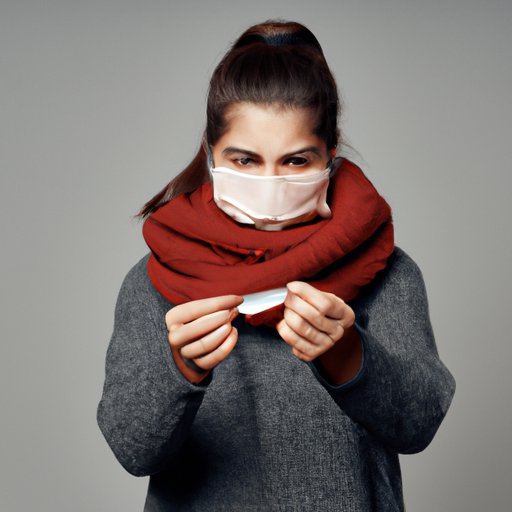
Introduction
Flu is a common illness that affects millions of people every year. Knowing the symptoms of the flu is important so that you can take steps to treat it and avoid spreading it to others. In this article, we will explore the symptoms of the flu, the difference between flu and cold, the importance of flu prevention, when to see a doctor, contagiousness of the flu, and tips for managing the flu.
Symptoms of the Flu
The symptoms of the flu usually come on suddenly and can be severe. Common symptoms include:
- Fever
- Headache
- Sore throat
- Cough
- Body aches
- Fatigue
- Chills
- Nausea, vomiting, and diarrhea (more common in children)
If you are experiencing one or more of these symptoms, it is possible that you have the flu.
The Difference Between Flu and Cold
It can be difficult to differentiate the flu from a cold as they share many of the same symptoms. However, the flu tends to be more severe and comes on more suddenly than a cold. Key differences between having the flu and having a cold include:
- Fever is rare with a cold but common with the flu
- A cold usually does not cause body aches or headaches, while the flu often does
- The flu tends to cause more severe symptoms overall
If you are unsure whether you have the flu or a cold, it is best to talk to your doctor for an accurate diagnosis.
The Importance of Flu Prevention
Preventing the flu is important because it is a highly contagious illness that can cause serious complications, especially in vulnerable populations like young children and the elderly. Some steps to prevent the flu include:
- Getting a flu shot every year
- Washing hands regularly with soap and warm water
- Staying home from work or school when you are sick
- Avoiding close contact with people who are sick
- Covering your mouth and nose when coughing or sneezing
- Disinfecting surfaces that may be contaminated with the flu virus
By taking these simple steps, you can reduce your risk of getting the flu and spreading it to others.
When to See a Doctor
If you suspect that you have the flu, it is important to see a doctor, especially if you are in a high-risk group like young children, seniors, or people with weakened immune systems. Some signs that your flu symptoms may be getting more serious include:
- Dizziness or confusion
- Decreased urination
- Chest pain or pressure
- Difficulty breathing
- Severe or persistent vomiting or diarrhea
If you experience any of these symptoms, seek medical attention immediately. Your doctor may prescribe antiviral medication to help lessen the severity of your symptoms and reduce the risk of complications.
Contagiousness of the Flu
Flu is a highly contagious illness that can be spread through the air when an infected person coughs, sneezes, or talks. It can also be spread by touching a surface that has the flu virus on it and then touching your eyes, nose, or mouth. A person with the flu can be contagious from one day before symptoms start to up to seven days after becoming sick. Children and people with weakened immune systems can be contagious for even longer.
To prevent spreading the flu to others, it is important to cover your mouth and nose when you cough or sneeze, wash your hands frequently, and avoid close contact with others when you are sick.
Tips for Managing the Flu
If you have the flu, there are several things you can do to help manage your symptoms:
- Get plenty of rest
- Stay hydrated by drinking plenty of fluids
- Treat fever with acetaminophen or ibuprofen
- Use over-the-counter medication to alleviate other symptoms like cough or sore throat
- Avoid contact with others to prevent spreading the virus
While there is no cure for the flu, these treatment options can help you feel more comfortable while your body fights off the virus.
Conclusion
Knowing the symptoms of the flu is important so that you can take steps to prevent it and treat it if you do get sick. By staying informed about the signs of the flu, taking steps to prevent the spread of the virus, and seeking medical attention when necessary, you can keep yourself and those around you healthy during flu season.





